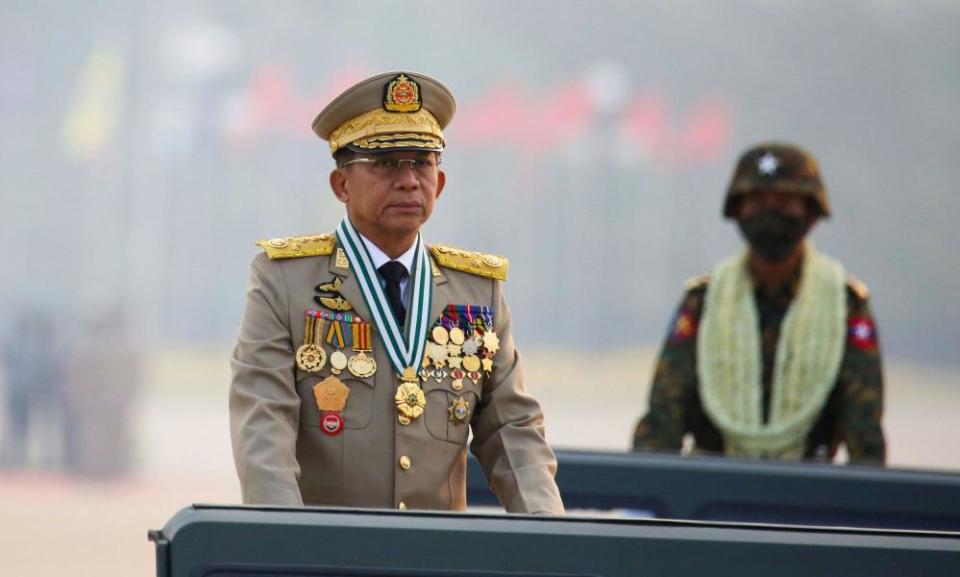Australia should target Myanmar ‘gang leader’ for sanctions, UN expert says

A top United Nations expert is in direct talks with the Australian government about how to expand sanctions against Myanmar’s military regime, and warned that crimes against humanity are being “committed before our very eyes”.
Tom Andrews, the UN special rapporteur on human rights in Myanmar, told Guardian Australia the government should target the commander-in-chief, whom he described as “the gang leader” responsible for mass atrocities, and should link additional sanctions with those imposed by other countries.
On Wednesday the Australian government attempted to reassure more than 3,300 Myanmar nationals in Australia that it was not planning to send them home when their visas expired, amid concerns about the dangers they might face in the wake of the 1 February coup.
The Australian government has condemned the coup and the killing of more than 700 civilians, but has not announced any sanctions beyond those applying to five military figures who have been on the list since 2018. Human rights groups have criticised Australia for appearing to act slower than some of its key allies and partners.
Related: Doctors under fire as Myanmar military targets efforts to aid injured protesters
In an exclusive interview, Andrews revealed that he had advised the government on expanding sanctions and had underlined the need to coordinate the measures with other countries.
“They have discussed this with me, where I’m in a series of discussions with members of the Australian government,” the US-based special rapporteur said.
“I can tell you they’re weighing their options very seriously. And I’m hoping that Australia and other governments of the world will not only increase their sanctions regime, but link their sanctions with other countries.”
Andrews said coordination would be critical because “there are more than 40 different sanctions regimes around the world, including Australia”.
“The only way to make those sanctions truly powerful is to link them together so that the collective weight of them will have the strongest possible impact on the junta.”
He said Australia and other countries should not shy away from sanctioning the Myanmar military’s commander-in-chief, Min Aung Hlaing.
“Start at the top. This is the gang leader – he’s the one responsible for this, he’s calling the shots and this is a very top-down command structure,” Andrews said.
“This man, who is leading the junta, who is responsible for initiating this [coup] and is responsible for these ongoing atrocities, he was the commander responsible for the mass atrocity crimes committed in 2017 against the Rohingya in Rakhine state.
This is widespread. It’s systematic. It is clearly ... crimes against humanity being committed before our very eyes
Tom Andrews
“Now he’s running the entire country. If you can’t sanction him, well, then who can you sanction? If you can’t hold him accountable, who can you hold accountable?”
Andrews called on countries to stop the flow of revenue to the junta by also targeting “business conglomerates that are owned and controlled by the junta and entities like Myanmar Oil and Gas Enterprise”.
Andrews, who is an independent expert tasked by the UN with monitoring the human rights situation in Myanmar, said he was “very alarmed” to see Myanmar’s military “coming in with weapons of war and assaulting a peaceful protest movement”.
“Not a day goes by without innocent people being killed,” said Andrews, who is also a human rights fellow at the Yale University law school and a former member of the US Congress from Maine.
Andrews believed there was “compelling evidence that crimes against humanity are being committed”, although he said a formal determination was a judicial process.
“It’s not a case of a renegade commander using particularly ruthless tactics on peaceful protesters. This is widespread. It’s systematic. It is clearly, in my view, crimes against humanity being committed before our very eyes.”
Australian government officials argued this week there were “no easy solutions” to the deteriorating situation in Myanmar.
Ridwaan Jadwat, who is in charge of the Department of Foreign Affairs and Trade’s south-east Asia division, signalled that further sanctions might be imposed soon, but also questioned the impact of international pressure.
Related: Is Myanmar the new Syria? Rising violence threatens a repeat tragedy
“To be frank with you … the Myanmar military regime in the past has been largely impervious to foreign influence and we hope in this instance that they will listen to the international community,” Jadwat told a parliamentary hearing on Tuesday.
Responding to this view, Andrews said: “Well, first I’d ask them: what’s their alternative? Is there something more effective that should be deployed?”
Andrews called for “actions that have a maximum impact on the junta, minimum impact on the people of Myanmar”.
“I may be wrong, but let’s try it and and let’s do everything possible to stop this brutality,” Andrews said.
The UN security council has not adopted any resolution in response to the Myanmar coup amid speculation China or Russia could use their veto powers.
Andrews said “countries who are unwilling to take action, who do not believe in a strong, unified response, should not be able to veto or undermine the opportunity for nations who believe in strong, principled action to take that action”.
He urged other countries to “put a strong, principled resolution before the security council, have a full debate, lay out the argument, lay out the evidence, and then let the chips fall where they may – let countries stand up and be counted”.

 Yahoo Finance
Yahoo Finance 